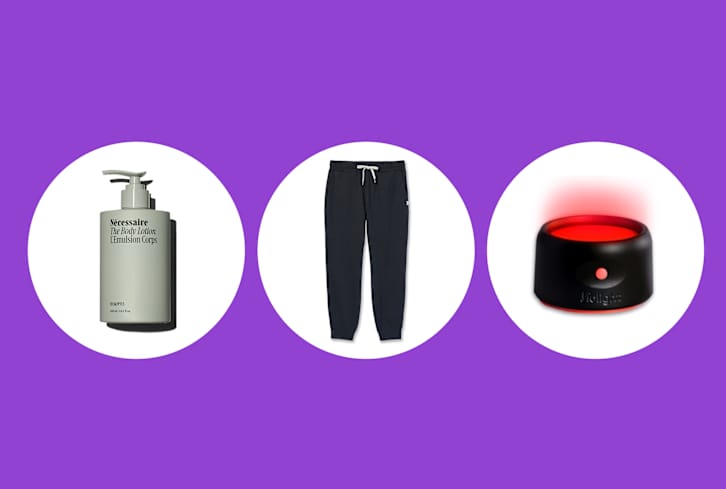Advertisement
What The American Heart Association Wants You To Know About The Heart-Brain Connection


Heart disease is the leading cause of death worldwide for both men and women. And 90% of people 20+1 in the U.S. have a risk factor for developing heart disease (!!).
If that's not scary enough, the American Heart Association (AHA) just released a scientific statement detailing a strong link between heart health and cognitive decline (like dementia and Alzheimer's).
So before we get into the nitty-gritty of how and why these chronic diseases are connected (and what to do to prevent them), there is hope. The gist of the statement is: There's strong evidence that preventing and treating heart diseases early can help protect cognitive function with age.
Now, let's get into the heart-brain connection and break down how common types of heart disease (heart failure, atrial fibrillation) influence memory and brain health.
The connection between the heart and the brain
Everything in the body is connected—including these two vital organs. The nervous system (which is controlled by the brain) helps regulate the heart, and the circulatory system is responsible for delivering nutrients and oxygen to the brain (which uses a whopping 20% of the body's total oxygen intake2).
The brain has a very intricate system of blood vessels that ensure it receives the oxygen and nutrients needed to function properly. But these blood vessels are small, fragile, and especially vulnerable to wear and tear.
As these blood vessels are part of the circulatory system, changes in the heart or vascular function, in general, impact the brain. Knowing this, it's not overly surprising that heart disease and cognitive decline share several risk factors. These include:
- High blood pressure (hypertension)
- Diabetes (which is known to damage blood vessels)
- Smoking
- High alcohol consumption
- Inactivity
- Poor sleep
- An unhealthy diet
- Pollutants
This new statement by the AHA details specific links between heart disease—heart failure, atrial fibrillation, and coronary heart disease (CHD)—and brain damage.
Heart failure
Heart failure is a serious condition in which the heart is not able to keep up with its workload and pump enough blood and oxygen throughout the body.
This suboptimal blood flow is linked to some vascular changes in the brain, but research indicates it doesn't account for all brain changes.
Studies indicate that changes in the heart structure of heart failure patients (such as a thicker heart wall or larger heart chambers) is independently linked to cognitive decline—suggesting that other factors like inflammation or even genetics may play a role.
Atrial fibrillation
Atrial fibrillation is a heart condition that causes an irregular (often faster) heartbeat.
Previous studies indicate that people with atrial fibrillation have a 39% higher risk of cognitive impairment than the general population. This condition is even linked to dementia in folks who have never had a stroke (a blood clot in the brain).
The authors of this new statement cite that both atrial fibrillation and dementia involve similar inflammatory processes. This inflammation can damage blood vessels, activate platelets, and increase the likelihood of clotting. This inflammation and the resulting vascular changes can worsen both the heart and brain.
Coronary heart disease
CHD occurs when the heart's blood supply is blocked or reduced by plaque buildup (which can be caused by lifestyle factors like high blood pressure and high cholesterol).
Research also indicates that inflammation stemming from CHD can damage the brain, specifically by weakening the blood-brain barrier (an added layer of protection for the brain that regulates the passage of particles between blood vessels and brain tissue). If this barrier is damaged, more harmful substances can enter the brain and trigger inflammation.
Not to mention, reduced blood flow to the heart can also lead to atrial fibrillation and its associated cognitive risks.
Prevention is key
Overall, early detection of heart problems and risk factors of heart problems (like high cholesterol and high blood pressure) are key to protecting your heart and your brain in the long run. Don't skip your yearly physical and always opt to get blood work to monitor risk factors.
It's estimated that over 80% of heart disease and stroke is preventable through lifestyle. Here's just a quick list of habits that can help:
- Bump up your fiber intake: Fiber is a nondigestible carbohydrate that can help lower cholesterol levels and balance blood sugar—both of which support blood vessel health. Only 5% of adults3 in the U.S. get the fiber they need daily (between 25 and 38 grams). Incorporate more fibrous foods like lentils, beans, avocados, chia seeds, and other fruits and vegetables into every meal and snack. Here are seven easy swaps you can make to seriously increase your fiber intake.
- Limit your alcohol intake: Alcohol intake at any level is associated with an increased risk for hypertension and coronary artery disease4 (an umbrella term that includes CHD), and excessive intake is linked to dementia5. And it's best to limit your alcohol intake for overall health. You don't have to go 100% sober if you don't want to. But mindfully consuming alcohol by reserving a drink for special occasions can significantly reduce your intake while still letting you enjoy the social joys of drinking.
- Eat more heart-healthy foods: A 2023 study found that people who underconsume fruit, vegetables, nuts, dairy, legumes, and fish had a higher risk of heart disease. Here's how to get more of these foods into your diet.
- Get more neuronutrients: Neuronutrients refer to specific compounds that offer some brain-boosting benefits. You can get some through foods or spices (think omega-3s from fatty fish or curcumin from turmeric) or even supplements. Resveratrol in particular is beneficial at promoting healthy blood flow (here's how to get enough without drinking red wine), and citicoline is a compound found in many supplements, and studies show that it improves both memory and behavior in those with Alzheimer's disease and in people recovering from strokes. You can't always get beneficial amounts of these neuronutrients through food alone, so here are our favorite expert-vetted supplements for cognition.
- Invest in an air purifier: Environmental pollutants are a combined risk factor for heart and cognition concerns. You can't control the air pollution where you live, but you can help keep the air in your home as clean as possible. And that's where an air purifier comes in. Look for HEPA-filter-based purifiers to best remove particles from the air. We narrowed down the best air purifiers for poor air quality here.
The takeaway
A healthy heart equals a healthy brain. Lifestyle plays a huge role in maintaining the health and function of both organs, and the actions you take now (whether you're in your 20s or your 60s) can have a significant impact on your well-being and longevity.
5 Sources
- https://jamanetwork.com/journals/jama/article-abstract/2818457
- https://www.sciencedirect.com/topics/medicine-and-dentistry/brain-oxygen-consumption#:~:text=The%20brain%20oxygen%20consumption%20is,per%20100%20g%20of%20tissue.
- https://www.ncbi.nlm.nih.gov/books/NBK56068/table/summarytables.t4/?rep
- https://jamanetwork.com/journals/jamanetworkopen/fullarticle/2790520
- https://www.bmj.com/content/362/bmj.k2927
Watch Next
Enjoy some of our favorite clips from classes
Enjoy some of our favorite clips from classes
What Is Meditation?
Mindfulness/Spirituality | Light Watkins
Box Breathing
Mindfulness/Spirituality | Gwen Dittmar
What Breathwork Can Address
Mindfulness/Spirituality | Gwen Dittmar
The 8 Limbs of Yoga - What is Asana?
Yoga | Caley Alyssa
Two Standing Postures to Open Up Tight Hips
Yoga | Caley Alyssa
How Plants Can Optimize Athletic Performance
Nutrition | Rich Roll
What to Eat Before a Workout
Nutrition | Rich Roll
How Ayurveda Helps Us Navigate Modern Life
Nutrition | Sahara Rose
Messages About Love & Relationships
Love & Relationships | Esther Perel
Love Languages
Love & Relationships | Esther Perel
What Is Meditation?
Box Breathing
What Breathwork Can Address
The 8 Limbs of Yoga - What is Asana?
Two Standing Postures to Open Up Tight Hips
How Plants Can Optimize Athletic Performance
What to Eat Before a Workout
How Ayurveda Helps Us Navigate Modern Life
Messages About Love & Relationships
Love Languages
Advertisement

Resting Heart Rate Is A Good Predictor Of Longevity—Here's How To Lower It
Molly Knudsen, M.S., RDN

Analysis Of 99 Studies Shows This Vitamin Improves Blood Pressure & Insulin
Molly Knudsen, M.S., RDN

Inflammation, Memory & Muscle Health — Study Shows This Spice Can Help It All
Molly Knudsen, M.S., RDN

This Nutrient May Help Calm Red & Irritated Skin (Nope, Not Collagen)
Molly Knudsen, M.S., RDN

Resting Heart Rate Is A Good Predictor Of Longevity—Here's How To Lower It
Molly Knudsen, M.S., RDN

Analysis Of 99 Studies Shows This Vitamin Improves Blood Pressure & Insulin
Molly Knudsen, M.S., RDN

Inflammation, Memory & Muscle Health — Study Shows This Spice Can Help It All
Molly Knudsen, M.S., RDN

This Nutrient May Help Calm Red & Irritated Skin (Nope, Not Collagen)
Molly Knudsen, M.S., RDN

Resting Heart Rate Is A Good Predictor Of Longevity—Here's How To Lower It
Molly Knudsen, M.S., RDN

Analysis Of 99 Studies Shows This Vitamin Improves Blood Pressure & Insulin
Molly Knudsen, M.S., RDN

Inflammation, Memory & Muscle Health — Study Shows This Spice Can Help It All
Molly Knudsen, M.S., RDN

This Nutrient May Help Calm Red & Irritated Skin (Nope, Not Collagen)
Molly Knudsen, M.S., RDN

Resting Heart Rate Is A Good Predictor Of Longevity—Here's How To Lower It
Molly Knudsen, M.S., RDN

Analysis Of 99 Studies Shows This Vitamin Improves Blood Pressure & Insulin
Molly Knudsen, M.S., RDN

Inflammation, Memory & Muscle Health — Study Shows This Spice Can Help It All
Molly Knudsen, M.S., RDN

This Nutrient May Help Calm Red & Irritated Skin (Nope, Not Collagen)
Molly Knudsen, M.S., RDN











